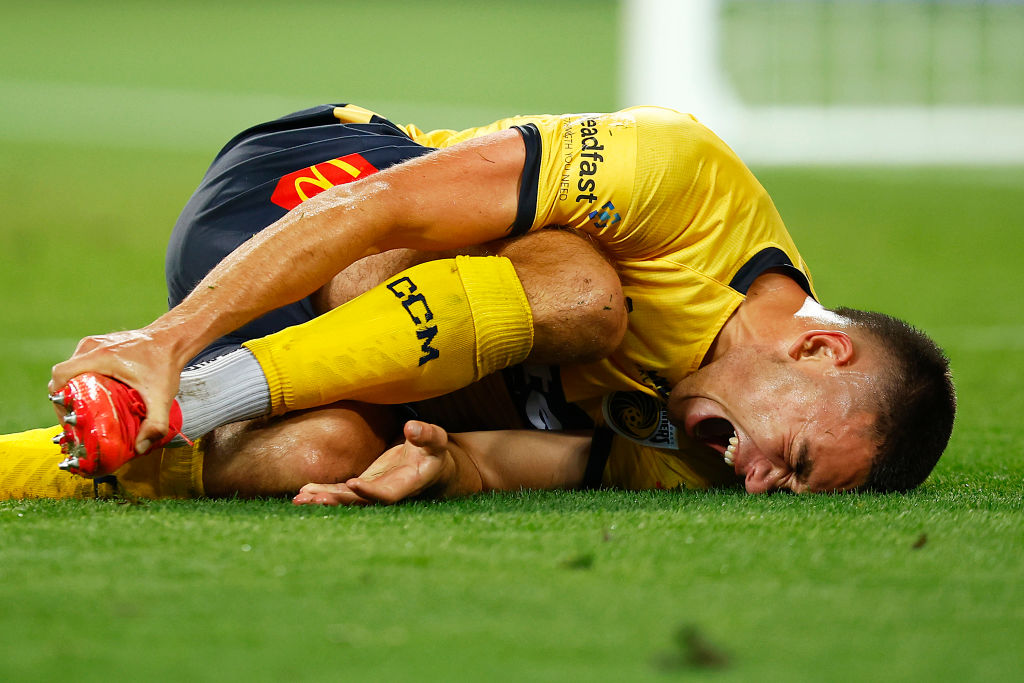Football Australia’s head of refereeing has confirmed that leading referee Shaun Evans made two significant errors in Tuesday night’s victory for Melbourne City over the Mariners, and has promised to speed up the time taken for video reviews.
Only appointed to the role at the end of last year, Nathan Magill said referees have to be accountable for their decisions in the wake of Evans twice declining to change his mind on key moments despite being invited to review them by the VAR.
As part of the unbundling of the A-Leagues from FA agreed last year, the referees in all competitions are now governed by FA, with Magill responsible for all levels from grassroots to the elite panel of fulltime refs, including the VARs.
After Evans awarded City a penalty for a challenge by Kye Rowles that appeared to be outside the box in the first half, and then declined to give Central Coast an injury time penalty for a foul by Mathew Leckie, he was recommended to review both decisions by VAR Kris Griffiths-Jones but stuck by his initial ruling in each case.
The controversy comes after fans protested at the time taken for VAR rulings over the weekend, and Evans’ second decision on Tuesday night was labelled “farcical” and “a disgrace” by TV pundit Daniel McBreen.
RECAP: ‘We’re still shocked’ – VAR calls leave Mariners ‘gutted’
“We feel the VAR was correct to recommend two onfield reviews as both of the incidents (decisions) crossed the threshold for clearly and obviously wrong on field,” Magill told KeepUp.
“The penalty kick awarded to Melbourne City for the challenge by Kye Rowles should have been a freekick outside the area. With the second incident… our position is that should be a penalty kick, the player’s challenge for the ball has missed and has made contact with the top of the opponent’s foot.”
Asked why Evans had stuck to both decisions, Magill said he had viewed the second part of Rowles’s challenge as the most significant, while for the second “the review went for a considerable amount of time so there was still some doubt for Shaun on the point of contact”.
Though Magill said it was too soon to say if Evans would be dropped from the next round of matches, he pointed out that there are almost twice as many referees as games each week.
“One of the words that we keep using with the referees, everyone needs to be accountable for their decision making,” he said. “Now we’ve got 13 referees and six spots each week, and usually the appointments are reflective of performance.”

The process of reviewing each decision took the game past 100 minutes, and while much of that was Evans reviewing footage, Magill said the VARs had to be better able to balance accuracy with speed, to avoid lengthy delays – the sort which characterised the video review system when it was first introduced.
“We had a workshop last week with our VAR and the first thing we spoke about was reducing the time of the reviews,” he said. “We want those reviews to be quick, we understand that it can cause a lot of a bit of frustration, and we want them to be quicker, to be honest. We want it to be in a process that gets that balance between speed and accuracy.
“We want to get both, but obviously people on the other end (spectators and TV viewers) only see the speed in which we deliver it.”
Asked whether he was comfortable with FA’s role in supervising referees at all levels – unlike in England, where elite referees are governed by their own body – Magill said referees wanted to play a role in facilitating captivating football.
“We have regular dialogue with the (A-Leagues’) football operations department, all of these type of issues and decisions are usually discussed,” he said. “The relationship there between (Commissioner) Greg O’Rourke and I is quite strong.
“We want to make sure that we’re contributing from a refereeing sense to entertaining football. As a referee group, our center mark is probably no different to the fans, in that we’re trying to find the balance between technically correct and allowing the game to flow.”





